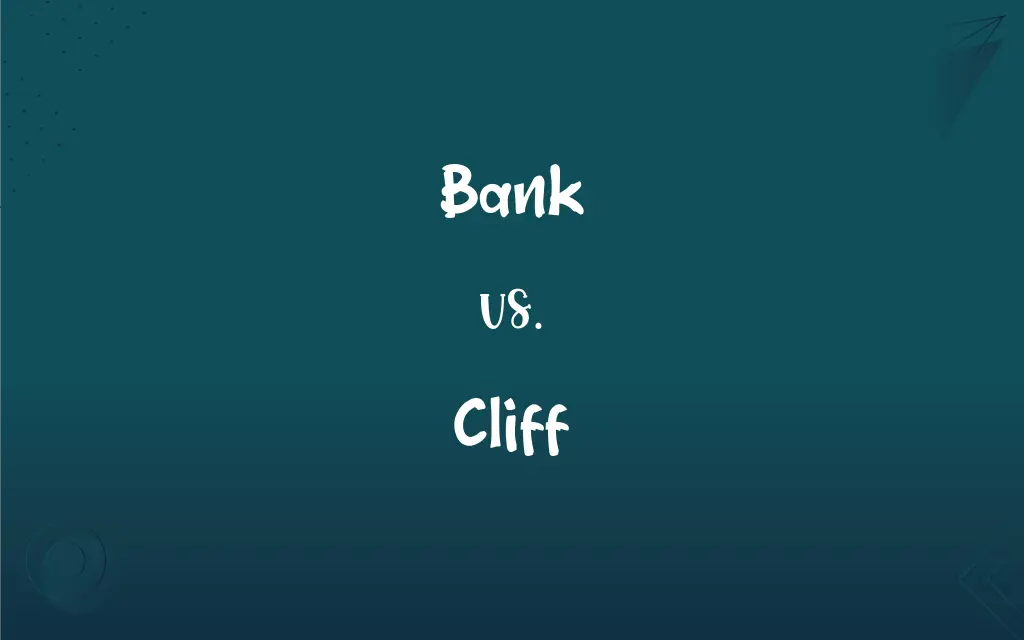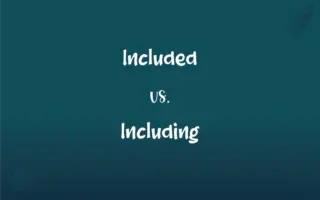Bank vs. Cliff: What's the Difference?
Edited by Aimie Carlson || By Janet White || Updated on November 13, 2023
Bank refers to the land alongside a river or lake, while cliff is a steep, high rock face, especially by the sea or river.

Key Differences
A bank is the land beside a body of water, generally more gradual in slope, and can be covered in vegetation. A cliff, in contrast, is characterized by its steep, almost vertical drop, often formed by erosion and lacking vegetation on its sheer surface.
Banks are formed by the accumulation of sediment along the edges of rivers and lakes, shaping the land over time. Cliffs are typically the result of erosional processes acting on harder rock formations, creating a sharp delineation between land and a body of water or open space.
The area of a bank is often used for leisure activities like picnicking or fishing and can be a habitat for various wildlife. Cliffs, due to their steep nature, are associated with dramatic landscapes, and can be hazardous for casual activities, but may be sought out for activities like rock climbing.
The bank of a river or lake supports a diverse range of plant and animal life, contributing to the ecological health of the waterway. Cliffs, while less hospitable, can be important nesting sites for certain bird species and have unique vegetation adapted to their harsh environment.
Banks are often integral to human settlements for access to water, transportation, and recreation. Cliffs, on the other hand, are less accessible but have been used for defensive purposes historically and offer scenic views, making them popular tourist destinations.
ADVERTISEMENT
Comparison Chart
Physical Form
Gradual slope beside water bodies.
Steep, high rock face, often vertical.
Formation
Formed by sediment accumulation.
Created by erosion of harder rock.
Typical Use
Leisure, fishing, habitat for wildlife.
Rock climbing, nesting for birds, scenic views.
Ecosystem
Supports diverse plant and animal life.
Hosts specific species adapted to harsh conditions.
Human Interaction
Accessible, used for water-related activities.
Less accessible, used for tourism and defense historically.
ADVERTISEMENT
Bank and Cliff Definitions
Bank
The land alongside or sloping down to a river or lake.
The children played on the river bank.
Cliff
A point of significant or dramatic change or transition.
The company was on the cliff of a major expansion.
Bank
A financial establishment for the deposit, loan, exchange, or issue of money.
She visited the bank to open a savings account.
Cliff
A high and steep face of rock or earth.
The climbers ascended the daunting cliff.
Bank
A slope or mound of a particular substance.
A bank of snow had piled up by the door.
Cliff
An extreme edge of land before a steep or vertical slope.
They admired the view from the top of the cliff.
Bank
A set or series of similar things, especially when positioned in a row.
A bank of switches controlled the machinery.
Cliff
A steep, high rock face, especially one beside the sea or a river.
The lighthouse stood precariously on the cliff edge.
Bank
The cushion of a billiard or pool table.
He skillfully shot the ball off the bank.
Cliff
A critical point beyond which a situation becomes disastrous.
The economy was teetering on the cliff of recession.
Bank
A piled-up mass, as of snow or clouds; a heap
A bank of thunderclouds.
Cliff
A high, steep, or overhanging face of rock.
Bank
A steep natural incline.
Cliff
A vertical (or nearly vertical) rock face.
Bank
An artificial embankment.
Cliff
(figurative) A point where something abruptly fails or decreases in value etc.
Cliff
A high, steep rock; a precipice.
Cliff
See Clef.
Cliff
A steep high face of rock;
He stood on a high cliff overlooking the town
A steep drop
FAQs
Are banks always by water?
Typically, yes, especially in geographical contexts.
Are cliffs dangerous?
They can be, due to their steep and often unstable nature.
What types of rocks form cliffs?
Cliffs are often formed from resistant rock types like limestone or granite.
Can cliffs be used for housing?
Rarely, due to the risk of erosion and landslides.
Are banks important for ecosystems?
Yes, they provide essential habitats for many species.
Can cliffs be found away from the coast?
Yes, cliffs can also be inland, especially by rivers or in canyons.
Can a bank be man-made?
Yes, banks can be artificially reinforced or constructed.
Do people live on banks?
Yes, many settlements are located on riverbanks.
Can cliffs collapse?
Yes, especially if undercut by waves or weakened by weathering.
Is fishing common on banks?
Yes, river and lake banks are popular for fishing.
Do all lakes have banks?
Yes, the perimeter of a lake is typically referred to as its bank.
How do cliffs affect local climates?
They can create microclimates and affect wind patterns.
How are banks formed?
They form from the accumulation and deposition of soil and sediment.
Are there plants on cliffs?
Some hardy plants can grow on cliffs, adapted to harsh conditions.
Do banks change over time?
Yes, they can erode or grow due to sediment deposition.
Do rivers always have banks?
Yes, banks define the edges of a river.
Can banks be prone to flooding?
Yes, particularly during heavy rains or high tides.
Why are cliffs important for tourism?
They offer dramatic landscapes and views, attracting visitors.
Are cliffs found in deserts?
Yes, cliffs can be found in various environments, including deserts.
What activities are popular on cliffs?
Rock climbing, hiking, and photography are common.
About Author
Written by
Janet WhiteJanet White has been an esteemed writer and blogger for Difference Wiki. Holding a Master's degree in Science and Medical Journalism from the prestigious Boston University, she has consistently demonstrated her expertise and passion for her field. When she's not immersed in her work, Janet relishes her time exercising, delving into a good book, and cherishing moments with friends and family.
Edited by
Aimie CarlsonAimie Carlson, holding a master's degree in English literature, is a fervent English language enthusiast. She lends her writing talents to Difference Wiki, a prominent website that specializes in comparisons, offering readers insightful analyses that both captivate and inform.































































